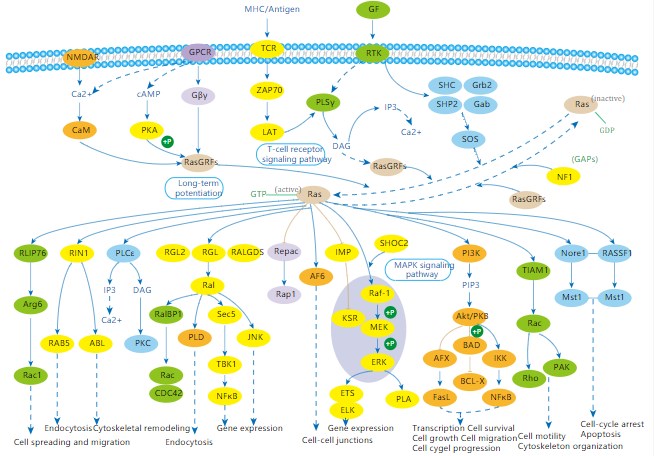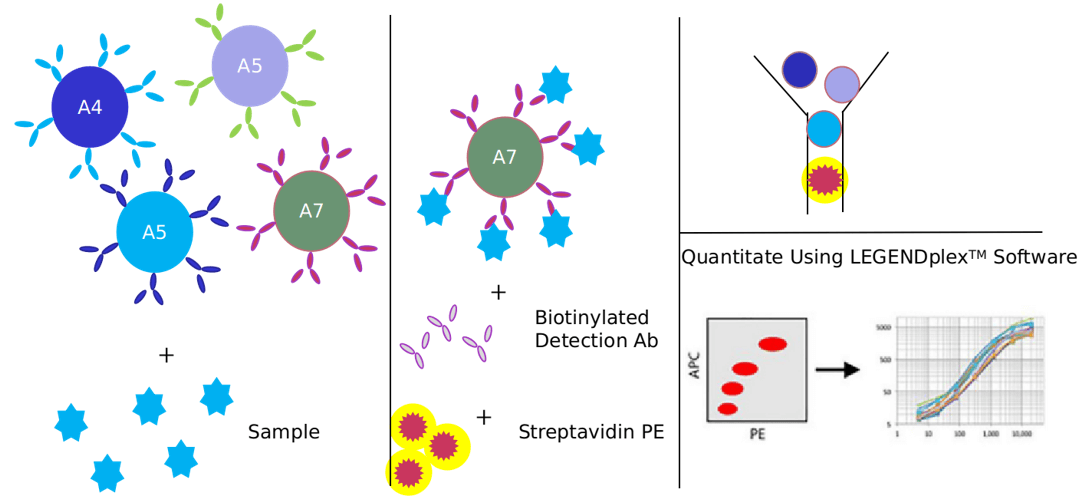RAS signaling pathway
Based on Luminex technology platform, Creative Proteomics provides analysis services for key targets of RAS signaling pathway.
The RAS proteins control signalling pathways that are key regulators of several aspects of normal cell growth and malignant transformation. They are aberrant in most human tumours due to activating mutations in the RAS genes themselves or to alterations in upstream or downstream signalling components. Rational therapies that target the RAS pathways might inhibit tumour growth, survival and spread.
RAS proteins, their regulators and the downstream enzymes that they control are activated in many tumour types by a variety of mechanisms, including oncogenic mutation of RAS genes. They are crucial mediators of several of the malignant characteristics of transformed cells and are therefore good candidates for tumour therapy. RAS proteins require post-translational modification by farnesylation to be biologically active. Farnesyl transferase inhibitors have some antitumour activity in the clinic, but they seem to act through targets other than RAS. Kinase inhibitors that block either RAF or mitogen-activated protein (MAP) kinase kinase MEK in the RAF/MAP kinase pathway downstream of RAS have been developed and show promise in early clinical trials. Inhibitors acting on epidermal growth factor (EGF) receptor and ERBB2 upstream activators of RAS have been developed. Antibodies directed against ERBB2 have been licensed for the treatment of breast cancer, whereas small-molecule EGF receptor inhibitors show potential against lung cancer in clinical trials. Other RAS-related therapies are in development, including inhibitors of AKT/PKB kinase activity, which is activated by RAS oncogenic mutation and by PTEN tumour-suppressor gene loss.

Our detectable targets:
| NMDAR | GPCR | TCR | GF | RTK | CaM |
| PKA | Gβy | ZAP70 | PLSy | SHC | SHP2 |
| Grb2 | Gab | Ras | SOS | LAT | NF1 |
| GRFs | RLIP76 | Arg6 | Rac1 | RINI | RAB5 |
| ABL | PLCE | PKC | RGL2 | CDC42 | RGL |
| PLD | JNK | TBK1 | NF-kB | Sec5 | Rap1 |
| Repac | AF6 | KSP | Raf-1 | MEK | ERK |
| ETS | ELK | PLA | FasL | BCL-X | AFXIKK |
| IKK | Rho | Rac | Akt | PKB | PAK |
| TIAMI | Mst1 | Nore1 | RASSF1 |
Technology platform
We provide Luminex technology for RAS signaling pathway analysis.
Luminex technology is a multifunctional liquid phase analysis platform developed on the basis of colored microspheres, laser technology, applied fluidics and high-speed digital signal processing technology. The core is to encode polypropylene microspheres or magnetic microspheres with fluorescent dyes. By adjusting the different ratios of the two fluorescent dyes, up to 100 microspheres with different fluorescence spectra can be obtained. Each kind of microspheres is covalently cross-linked. Capture antibodies against specific antigens.
The RAS protein control signaling pathway is a key regulator of several aspects of normal cell growth and malignant transformation. Play a major role in inhibiting the growth, survival and spread of tumors.
In addition to Luminex Multiplex Assay, Enzyme-linked immunosorbent assay (ELISA), Flow cytometry (FACS analysis) technology can also be provided to meet other customer needs.
Advantages of RAS signaling pathway detection:
- High flexibility: specific probes, antigens or antibodies can be connected to the microspheres to meet the needs of different customers.
- High sensitivity: the detection limit can reach 0.01pg/ml.
- Good repeatability: similar homogeneous reaction mode, each indicator has 1000-5000 reaction units, and the median value of 100 analysis is taken.

Application of our service:
- To study the effect of each virus on RAS signaling pathway
- To study the regulation mechanism of RAS signal pathway in disease
- To study the effects of drugs or therapies on RAS signaling pathways
Creative Proteomics has developed a signal pathway target detection platform. We are not limited to providing RAS signal path detection services, but can also provide other signal path detection services. If you want to detect other targets, please contact us and we will customize the service for you. Look forward to working with you.
References:
- Afsane Bahrami, et al. Targeting RAS signaling pathway as a potential therapeutic target in the treatment of colorectal cancer. Journal of Cellulae Physiology, 2018, 233(3): 2058-2066.
- Bos, J. L. Ras oncogenes in human cancer: a review. Cancer Res. 2018, 49, 4682–4689.
- Hancock, J. F., Magee, A. I., et al. All ras proteins are polyisoprenylated but only some are palmitoylated. Cell, 2019, 57, 1167–1177.

